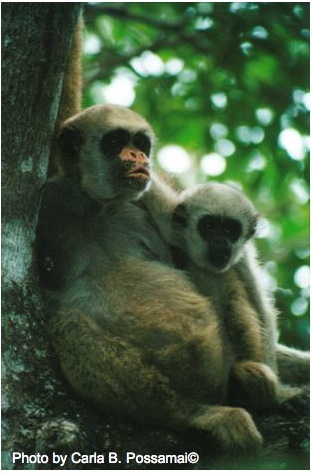Muriqui Behavioral Ecology
Demo Site
The Muriqui Behavioral Ecology Database (MBED) was designed by Karen B. Strier and Jason Altekruse to permit analyses of the behavior and ecology of the critically endangered northern muriqui (Brachyteles hypoxanthus). The systematic data represented in the database come from the ongoing, long-term field study of the northern muriqui population at the Reserva Particular do Patrimônio Natural - Feliciano Miguel Abdala (RPPN-FMA), a privately-owned, federally protected forest flocated in Caratinga, Minas Gerais (19o44’S, 41o49’W). MBED includes behavioral and ecological data on all individuals in the four muriqui groups that comprise the population. The data were collected by teams of trained observers using scan samples conducted at 30-minute intervals from August 2010 through the present.

MBED includes the scan sample data initially collected under NSF award BCS 0921013 (Funding period: 2009-2014,) “Niche Expansion and Terrestriality in an Arboreal Primate,” (PI: Karen B. Strier) and continued thereafter. The Specific Aims of the NSF project were to build on the long-term field study of a population of northern muriqui monkeys that has been under investigation since 1983, to investigate ecological and behavioral patterns associated with niche expansion and spread of a terrestrial tradition within and among the four groups inhabiting a 957 hectare forest fragment in southeastern Brazil. The behavioral sampling was designed to: (i) Evaluate the relationships of vertical niche expansion on grouping, ranging, and activity patterns; (ii) Identify the mechanisms involved in the social diffusion of the terrestrial tradition between groups; and (iii) Document variation in patterns of social transmission of local traditions within groups. However, many of the same data collected for these aims can also be employed to investigate other aspects of muriqui behavioral ecology; some of these parallel studies are currently underway as graduate dissertation projects of past participants on the project.
This Demo site was created to illustrate a sample of actual data in MBED. Source code for MBED was written by Jason Altekruse and can be found at GitHub.
Acknowledgments
Funding for the development of MBED and for the data collection in the field was provided by the NSF BCS 0921013, the Margot Marsh Biodiversity Foundation, the Graduate School of the University of Wisconsin-Madison WARF Professorship (2009-2016), a Hilldale Professorship (through 2011) and a Vilas Research Professorship (since 2011) from the University of Wisconsin-Madison. Additional support from Pablo Fernicola, Sonia Souza, and the Microsoft Corporation Employee Matching Gifts Program has contributed to the project. The field research that produced the data in this database has complied with all institutional IACUC guidelines and U.S. and Brazilian regulations. We thank the Brazilian government and CNPq, and the Sociedade Preserve Muriqui for permission to conduct the field research, and the participants on the Muriqui Project of Caratinga since 2010 (André Ferreira, Tatiane Cardoso, Marlon Lima, Carla B. Possamai, Antonio Robério G. Freire Filho, Igor I. Martins, Pollyanna S. Campos, Fabricio Fernandes, Marina Schultz, Ana Biatriz Siqueira de Morais, Anamélia de Souza Jesus, Thiago Cavalcante Ferreira, and Fernanda Tabacow), all of whom contributed to the collection of the behavioral data stored in MBED. Others involved in earlier phases of the database development and support include Dorothea Salo, Jan Cheetham, and Bruce Barton of UW Madison Research Data Services, Stuart Ballard, and SSCC hosts Nancy McDermott & Dan Bongart.